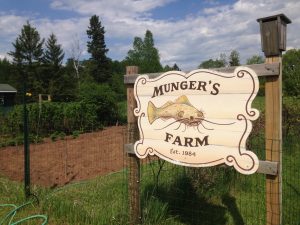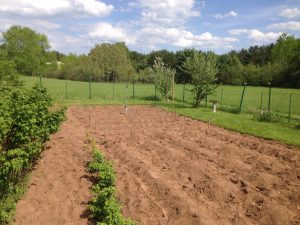
Both sides of my family once worked the land. On my paternal side, my grandfather, Harry Munger, Sr. came from a farming family. His father, Lyman Munger was one of the earliest homesteaders in Otter Tail County. But despite Lyman’s attempts at being a philosopher/farmer, his legacy, at least the one that survives, is that of being more philosopher than farmer. His son, Grandpa Harry, spent most of his life working jobs that didn’t involve tilling the earth, planting seeds, and harvesting. However, Grandpa could not entirely escape the enticement of dirt. As a small child, I spent many an afternoon walking with Grandpa Harry through the narrow rows of his unkempt vegetable plot behind an equally unkempt two-story house in Duluth’s Riverside neighborhood. I remember weeds. I remember tangle. I remember raspberries and little else actually being harvested from that garden. My own father, Harry, Jr., has expressed agricultural aspirations but that’s where his involvement with the soil ends. But on the Zuehlsdorf side of my father’s heritage, the maternal side, there’s a history of industrious husbandry and cultivation. My grandmother’s father was a master farmer who owned four working farms outside Fergus Falls, Minnesota. And then there is my mother’s side of things. Her father, a Slovenian immigrant, wasn’t interested in the soil. Grandpa Jack was many things: outdoorsman; resort builder; miner; salesman; and Mason. But he wasn’t, so far as I can recall, a gardener. His youngest sibling, Steve “Stutz” Kobe, on the other hand, loved to work dirt.
Great Uncle Stutz lived his whole life in Aurora, Minnesota. A quiet, single man who, according to family lore, lost his one and only true love to parental objection, Stutz worked not in the iron mines of the Mesabi Range but as a trackman for the DM&IR, the short haul line that served the mines of NE Minnesota. Stutz lived the majority of his adult life with Great Aunt Ann, my grandpa’s younger sister, a woman of kind heart, small stature, and big emotions. She was widowed early in her marriage and, with Stutz’s help raised two dark eyed, dark haired sons in a little white frame house a few feet away from the DM&IR tracks that Stutz repaired.
Last Saturday, as I planned my vegetable garden, first tilling the sandy soil, and then, slowly, methodically placing stakes in the ground to prescribe each row, I thought of Uncle Stutz and how, more than anyone in my family, his love of gardening compels me to fight off age and competing interests to work the soil. He’s been gone at least fifteen years but as I crawled through the dirt, poking holes in the loam with my index finger, laying in seeds, and tapping loose earth to cover my plantings I smiled at the thought that somewhere, in some other realm, Stutz was watching with approval.
Stutz Kobe wasn’t especially intelligent or ambitious or worldly. He was just one of those older relatives who expressed his love of family in very simple and straightforward ways. When I was working on a log cabin that my buddies and me were building in the wood lot of the old Tynjala farm in nearby Makinen, I’d drive over to Aurora, stop in, and see Ann and Stutz. I’d saunter up to the front door, knock, and invariably, Stutz, who was retired, would answer. His greeting was always the same:
“Markie, Markie! Come on in and have a beer.” Then he’d turn and holler: “Ann, Markie’s here. Fix him a sandwich, will you?”
We’d sit in the enclosed front porch, the windows open to summer heat, the screens keeping the flies and mosquitoes at bay, talk baseball and politics, eat our sandwiches, and sip Grain Belt. One time, when I was single-handily adding a loft to the cabin, I showed up at Ann’s for supper, a hot bath, the obligatory cold beer, and a good night’s sleep in Ann’s extra bedroom.
When I’d visit during the summer, Stutz would pridefully show me his carefully plotted, diligently weeded vegetable garden. Over the noise of passing ore trains rumbling behind the house, I’d study the man’s handiwork and admire his fortitude. I can’t say I consciously knew during those brief moments that I’d someday try to emulate Stutz’s green thumb. But later on, after Rene’ and I married and we moved to the country and inherited an already existing vegetable plot, when I came in contact with Stutz at funerals, weddings, visits, or Kobe family reunions, my great uncle always asked: “How’s your garden?” In truth, while I’ve tried hard to replicate the diligence that Stutz injected into his cucumbers and potatoes and tomatoes and sweet peas and pumpkins and assorted other crops, I’m more Munger than Zuelsdorf when it comes to working the land. Still, Stutz’s quiet, steadfast example manifests every summer as I weed raspberries, hill squash, or pick ears of sweet corn under August’s swelter.
I’ve been blessed with many mentors in my life. Some of those folks were college educated. Others, like Stutz, were quiet, hardworking people whose advice was based, not upon great intellect or learning, but upon finding and accepting life’s simple pleasures. I thought about the lessons Great Uncle Stutz gifted to me last Saturday afternoon as I put away the tiller, dusted off my jeans and scrutinized my newly planted garden.
Peace.
Mark


